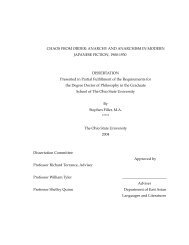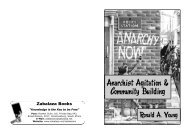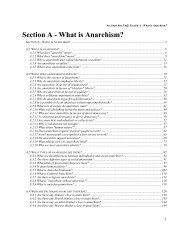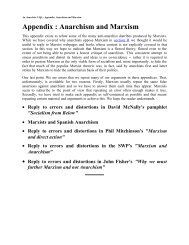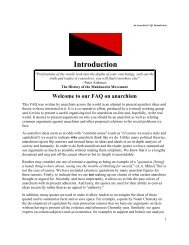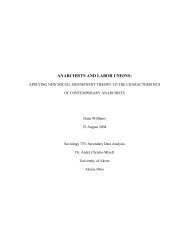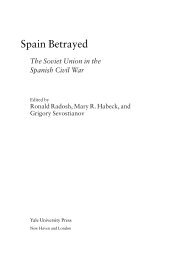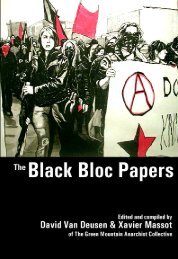Graham Gamblin - Infoshop.org
Graham Gamblin - Infoshop.org
Graham Gamblin - Infoshop.org
Create successful ePaper yourself
Turn your PDF publications into a flip-book with our unique Google optimized e-Paper software.
later. 5 Proudhon's position was shared and developed in a more rigorous and<br />
faced by the exploited classes, for which the entire economic and social edifice would<br />
have to be radically changed. Governments, he claimed, always served an elite; he<br />
looked to a federation of independent producers and other groups for the new social<br />
<strong>org</strong>anisation. His criticism of government and centralism applied equally to the<br />
socialist state and the dictatorship of the proletariat advocated by Marxists. Indeed,<br />
Proudhon claimed that peasants and workers had the same interests, as the have-nots<br />
in society, and assigned no leading role to the proletariat in social change. This<br />
represents an obvious difference with Marx, who discounted the peasantry as pettybourgeois<br />
and reactionary and furthermore, destined to die out as a class as capitalism<br />
advanced.<br />
With the advent of the first International Workingmen's Association in 1864,<br />
Proudhonist mutualists came to see important differences between their position and<br />
that of Marx's followers. While Marxists looked to the industrial proletariat as the<br />
vanguard of revolution, the mutualists included peasants, artisans and small traders in<br />
their constituency; where Marxists valued the conquest of political power for the<br />
benefit of workers, Proudhon's followers favoured its abolition; and while Marxists<br />
favoured a strong centralised <strong>org</strong>anisation to accomplish revolution, mutualists<br />
advocated federalism. These differences created two wings within the International<br />
during the course of the 1860s and sowed the seeds of the split which was to come<br />
revolutionary form by Mikhail Bakunin. 6 Bakunin insisted that the new society had to<br />
be based on, and spring from, autonomous groups working freely together, a society<br />
<strong>org</strong>anised from the bottom up. Bakunin opposed Marx's centralism, which was<br />
gathering power in the International at the expense of the autonomy of local sections.<br />
His opposition was based on his critique of political authority; for Bakunin, the very<br />
existence of powerful centralised institutions would encourage some group or other to<br />
use them for their own benefit. Basically, while for Marx the state was evil because it<br />
Joseph Proudhon London 1956; A. Ritter The Political Thought of Pierre Joseph Proudhon Princeton<br />
1969. Proudhon also occupies a chapter in most general works on anarchism and socialism.<br />
5 For the First International see eg. G.M. Stekloff History of the First International London 1928;<br />
G.D.H. Cole A History of Socialist Thought v.II- Marxism and Anarchism London 1954; J. Braunthal<br />
History of the International v.I London 1966<br />
6 For Bakunin, see eg. R. Saltman The Social and Political Thought of Michael Bakunin Westport<br />
1983; A. Mendel Michael Bakunin New York 1981; E. Pyziur The Doctrine of Anarchism of Michael<br />
3



